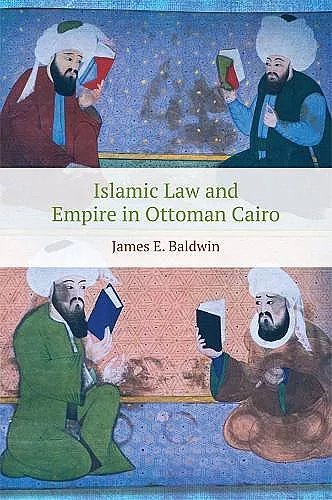Islamic Law and Empire in Ottoman Cairo
Format:Paperback
Publisher:Edinburgh University Press
Published:22nd Feb '18
Should be back in stock very soon

What did Islamic law mean in the early modern period, a world of great Muslim empires? Often portrayed as the quintessential jurists’ law, to a large extent it was developed by scholars outside the purview of the state. However, for the Sultans of the Ottoman Empire, justice was the ultimate duty of the monarch, and Islamic law was a tool of legitimation and governance. James E. Baldwin examines how the interplay of these two conceptions of Islamic law – religious scholarship and royal justice – undergirded legal practice in Cairo, the largest and richest city in the Ottoman provinces. Through detailed studies of the various formal and informal dispute resolution institutions and practices that formed the fabric of law in Ottoman Cairo, his book contributes to key questions concerning the relationship between the shari‘a and political power, the plurality of Islamic legal practice, and the nature of centre-periphery relations in the Ottoman Empire.
An elegantly written, well-structured, and convincing argument that will certainly stimulate scholarly discussion. This makes the book vital reading not only for scholars of Islamic law but also for historians of the Ottoman Empire. -- Felix Konrad, University of Basel * Die Welt des Islams *
An elegantly written, well-structured, and convincing argument that will certainly stimulate scholarly discussion. This makes the book vital reading not only for scholars of Islamic law but also for historians of the Ottoman Empire. -- Die Welt des Islams * Felix Konrad, University of Basel *
Drawing on a rich variety of primary sources in both Arabic and Ottoman Turkish, Baldwin provides a very valuable reinterpretation of law and politics in Ottoman Egypt. In particular, he convincingly challenges the image of the autonomous judge as the pivot of Ottoman legal system, and instead argues that the judge should be placed within a complex network of legal institutions with overlapping jurisdictions. As a result a very rich and detailed picture of law and politics emerges, a picture that illustrates the relationship between imperial center and provincial societies, between shari‘a and state power, and between sultan and litigants. This is a very significant contribution to Islamic legal studies, Ottoman history and scholarship on early-modern Egypt.' -- Khaled Fahmy, King's College, University of Cambridge
ISBN: 9781474432139
Dimensions: unknown
Weight: 386g
248 pages